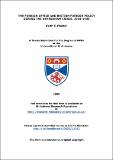The Foreign Office and British foreign policy during the Abyssinian crisis, 1934-1935
Abstract
This is not a thesis about the Abyssinian Crisis or even, for that matter, Britain and the Abyssinian Crisis. Rather, it is about British foreign policy and the Foreign Office during the crisis. While a considerable amount of scholarship dealing with the Abyssinian Crisis has appeared, there has not been, at least to my knowledge, a full-scale study of this particular aspect of the crisis. That the subject warrants such scrutiny is, in my mind, without question. Indeed, the crisis shattered British foreign policy. At the end of the day, the League of Nations was crippled, and Italy, once Britain's ally against Nazi Germany, was alienated. In the process, Britain's Foreign Secretary was forced to resign. I have written this thesis as a functional analysis designed to address the question of how British policy evolved and was implemented during the Abyssinian Crisis, the assumptions upon which that policy was based, the long and short-term goals of that policy, and the Foreign Office's day-to-day management of policy, will all be examined. The personalities of those in charge of British policy, and policy disputes between the Foreign Office staff will also be given full coverage. Drawing primarily from Foreign Office documents, I will look at British policy leading up to and culminating in, Sir Samuel Hoare's trip to Paris and the so-called Hoare-Laval "Pact." Thus I will examine Hoare-Laval as a case-study. Since British foreign policy during the Abyssinian Crisis originated in, and was carried out by the Foreign Office, then it is there that an explanation for Britain's behaviour during the crisis will be found. However, since a study of British policy during the Abyssinian Crisis would be incomplete without some elucidation of the Cabinet and Cabinet subcommittees' role in the policy-making process, I have devoted one chapter to this purpose.
Type
Thesis, MPhil Master of Philosophy
Collections
Items in the St Andrews Research Repository are protected by copyright, with all rights reserved, unless otherwise indicated.

